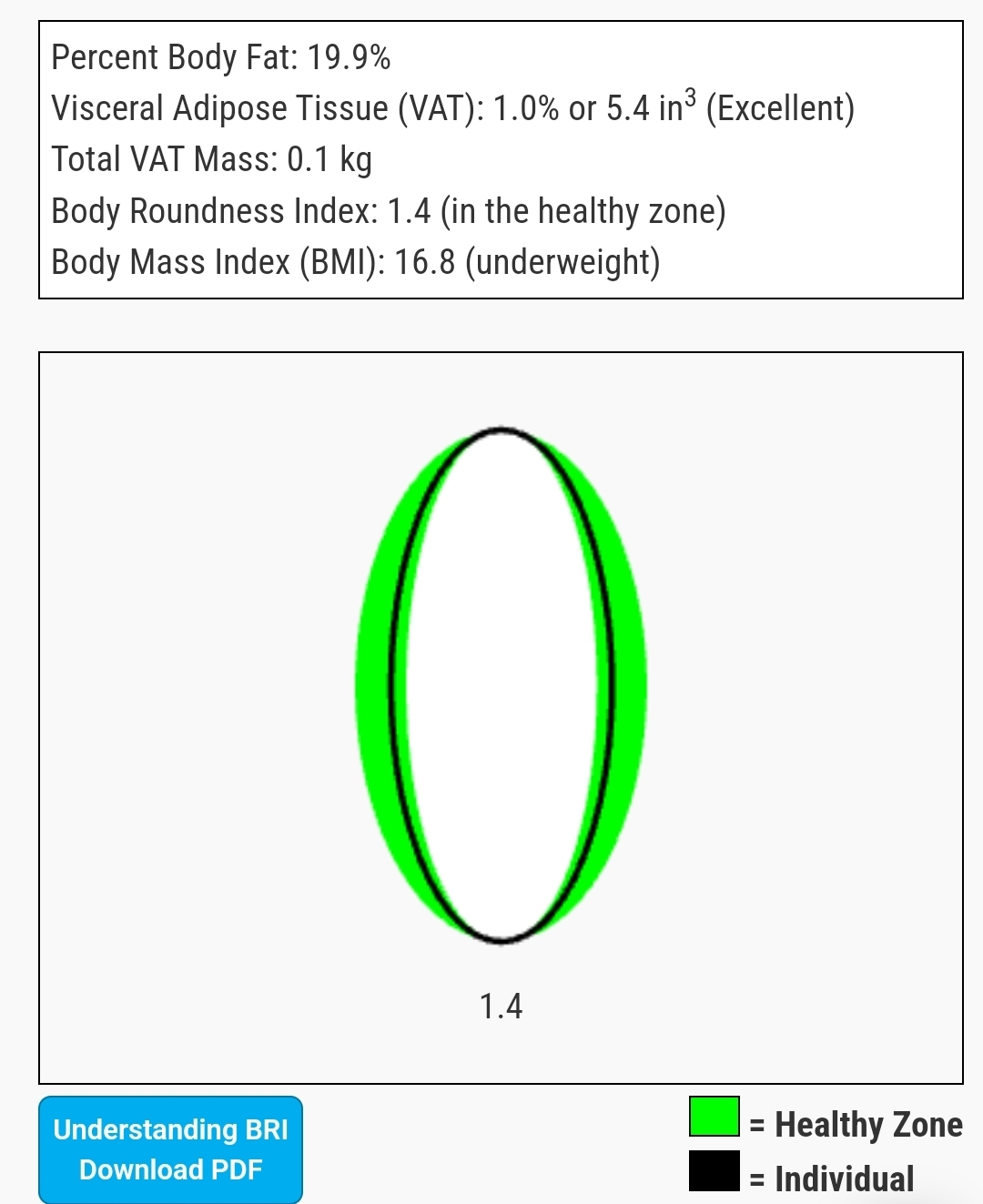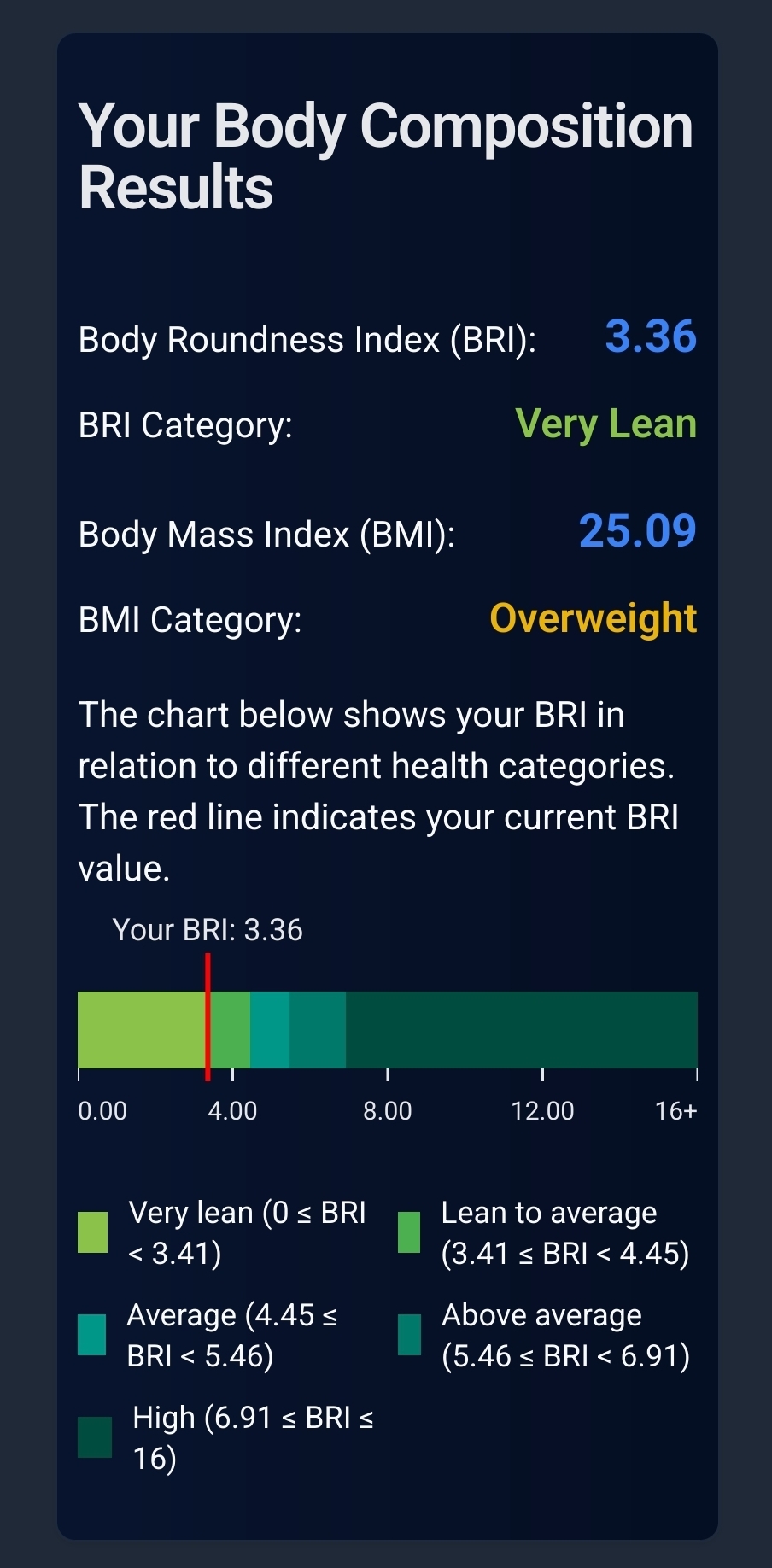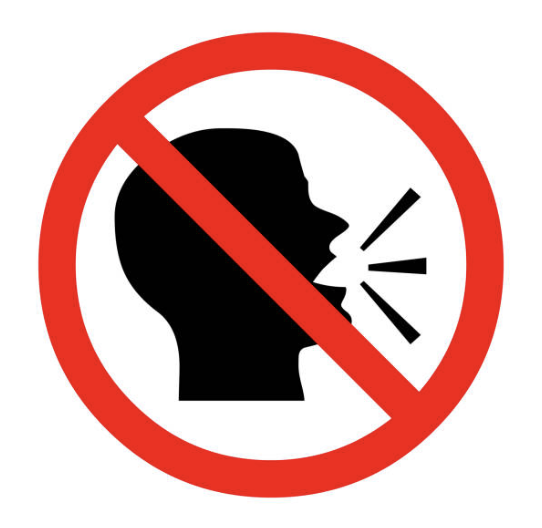“The body mass index has long been criticized as a flawed indicator of health. A replacement has been gaining support: the body roundness index.” Article unfortunately doesn’t give the freaking formula for chrissakes; it’s “364.2 − 365.5 × √(1 − [waist circumference in centimeters / 2π]2 / [0.5 × height in centimeters]2), according to the formula developed by Thomas et al.10”
BMI is the best measure we have for statistical purposes (i.e., a population) because it’s been around for 50(?) years and is what is often used in studies, so you can compare one study to another using BMI.
It’s also not terrible for a population because it averages out. But for an individual it is definitely not a good measure because there are way too many other variables that matter.
I think there is a better one, it’s called a mirror. I look at it every day and cry, but there is no question lol

This is the ideal male body. You may not like it, but this is what peak performance looks like.
Don’t skip scarf day
As an overweight 35 year old who wore skinny jeans: I feel this.

Here’s an online calculator
How come there’s a metric button that doesn’t work?
Worked for me.
Drag tried on mobile and PC. Every time drag clicked metric, it reloaded and switched back to imperial.
Why are you referring to yourself in the third person?
Drag isn’t referring to dragself in the third person. Drag is using drag’s first person neopronouns.
As a separate person, Drag is not Dragonfucker but concurs that Drag pronouns make Drag sound very cool, and Drag would like to adopt Drag’s neopronouns for Dragself as well.
Awesome, drag is glad Drag likes them.
It “works” for me, but if you want to put in xxx in CM, it might not be there because they stick to inches and you need to round up/down :/ For example, it goes 170cm to 173cm
Hmm, that puts me at BRI of 2.1, and BMI of 35.4
Those both seem incredibly off.
But I do have extra dense bones apparently, which tends to be mostly what screws with my BMI, and my ability to float/swim. But they seem really hard to break, not that I try very hard… but none of them have broken yet. And I’ve been in situations that seem like they should have broken.
Either way, I weigh alot more than I look like I should, not quite “Wolverine getting on a motorbike”, but a bit like that.
Kinda makes me wish those “guess your weight” carnival experts were something I could see in real life, only ever seen it on TV.
Thank-you.
I’m from the UK and grew up in the seventies. I can’t do metric or imperial without help!
It’s incorrect, it claims my body fat is 19% when I know for an absolute fact it’s 22%.
Much better estimate than BMI innit?
I think interestingly enough it’s inaccurate in the other direction. While BMI is will call people unhealthy if they have a lot of muscles, this will call people healthy if they are like me severely underweight.
My roundness index claims it’s in the healthy zone while in reality my weight is unhealthy.

How do you know you’re unhealthy?
I’m currently receiving treatment for onset osteoporosis caused by malnutrition. Also it’s kinda obvious your weight is probably not healthy when your ribs are sticking out.
looking it up, BRI ranges from 1 to 16, but somehow there isn’t an accepted definition of underweight
Can’t tell you how disappointed I am that isn’t just a chart of increasingly tubby kittens.
Lvl. 10: “oh lawd he comin’”
Replacing BMI with BMI2 is fine, but it’s doesn’t change the fact that most Americans are overweight or obese, and the tiny, tiny sliver of people who have a high BMI from weightlifting are insignificant relative to the ~70% that are just plain fat
There’s also a lot of people who had essential muscles replaced with fat, thus evading the overweight designation while having an imminent risk of diabetes. This reflects that.
Help me out here. What’s BMI2 - searching gives me computer related stuff and running “BMI weight” just gives old BMI stuff.
They’re just calling this new thing BMI2 as shorthand
Oh, ok. Thank-you.
Yay, I’m a tiny sliver!
Waist to height is the only proven metric. And the problem with BMI is not that it is overestimating fat, it’s that it’s underestimating fat because it completely misses skinny-fat people, and the number of those is much higher than the number of jacked overweight not fat athletes.
Add to this the complicating factor that it’s really torso fat that is metabolically active and dangerous to your health.
Waist should be less than half your height, you don’t even need a measuring tape. Get someone to cut a string as long as you are tall, and see if it can go around your waist twice, with at least some extra length. If so, you are good, probably don’t have too much torso fat.
ETA I don’t understand why they need that complicated formula, why not just a ratio? The only inputs are waist and height. Never understood the point of squaring height to get BMI either, it’s also just a mass to height comparison, why not a simple ratio?
…people…have…waists…that’re…half their height‽‽‽‽
Circumference, not width
people have wrists that are 1/6.28⋯ their height‽‽
That’s a strong wrist. Too much self-pleasure!
peopleofwalmart.com has entered the chat
I’m a normal sized human.
72inches tall (6’) 32inch waist
I could easily see a fat dude having a 40 inch waist at 6’ tall.
Oh shoot I conflated wrists with waist😭
Right, you are proportionate, waist to height as a measurement means a 7’ tall guy would be healthy with a 40" waist, but a lady (or man) who is 5’ tall really does need smaller than 30" to be in shape.
6’ fat dude here… 46" I think… maybe only 44…
What if your torso is large because your large liver because alcoholism?
It is one of the most widely used health metrics but also one of the most reviled, because it is used to label people overweight, obese or extremely obese.
That’s like blaming the ruler for labeling you too short or too tall… Can’t we just use the tool for rough assessment, while being aware of its limitations, and be happy about it?
Look at it this way, BMI is a cross section of weight and height. I was considered “overweight” for ages because I just had tree trunk thighs from hiking and weightlifting. Like, less than 16% body fat but told I’m ‘overweight’ every time I got weighed.
The ruler was fucking wrong.
Nowadays, I’m much more of a fat fuck so the ruler is right now but only just so… I’m still under 25% when using hydrostatic!
i think you’re taking that quote out of context a bit. a few sentences later, the article says
Even physicians have weighed in on the shortcomings of B.M.I. The American Medical Association warned last year that B.M.I. is an imperfect metric that doesn’t account for racial, ethnic, age, sex and gender diversity. It can’t differentiate between individuals who carry a lot of muscle and those with fat in all the wrong places.
“Based on B.M.I., Arnold Schwarzenegger when he was a bodybuilder would have been categorized as obese and needing to lose weight,” said Dr. Wajahat Mehal, director of the Metabolic Health and Weight Loss Program at Yale University.
so the point they seem to be making is that, while BMI is controversial partly because people like to shoot the messenger, it’s also just not a reliable measurement in a medical context, even as a heuristic. the article also goes into more detail on its other shortcomings as well. the article also indicates how BMI was never intended to be used in a medical context. so, there are plenty of valid reasons for wanting a new metric.
but i do think the sentence you quoted isn’t really doing the author any favors in terms of trying to communicate the central point of the article.
Seems like a lot of the flaws just have to do with the fact that the real metrics you want to use, which would probably be body fat percentage, are hard to measure accurately at home.
Or just make a better ruler?
my main beef is that “too fat” is a wildly varying scale from person to person because everyone stores and processes fat differently. and if you’re “too fat” that may not in fact be your most relevant health concern. my experience with health providers that focus on BMI during intake is that if you’re “overweight” many other health problems will be seen through that lens even if they’re unrelated… in my case, lots of dieting advice, being told to exercise more come to find out decades later I had an undiagnosed nervous/muscular condition. now that it’s treated somewhat, my weight stays pretty much in “normal” BMI with the same or lower activity. I’m kinda pissed it took this long to get treatment for an underlying condition because the ruler said “too fat.”
it’s easy to calculate but extremely rough. Efficacy varies immensely. Look, nobody’s forcing you to do anything, I’m just saying that BMI is way too rough to be seriously examined.
For all the time I’ve been told how bad BMI is, and how it classes top athletes as obese, I can’t help but notice how few of those people have the body of a top athlete.
That’s because BMI is actually pretty good as a screening tool. It’s easy, simple, and pretty damn accurate when combined with an eyeball test. To the extent that it misclassifies people it is far more likely to underclassify obesity than overclassify. The people complaining just don’t want to hear it.
not for the army
That’s an extreme case, but the point still stands. For example, right now, I’m pretty fat, because I haven’t shifted the weight I gained over COVID. Even though I’m visibly way larger than I was, I’m not much heavier than I was pre-covid, because I’ve lost a heckton of muscle. It’s insane to me that BMI will look at me pre-covid, and look at me now, and say “that’s the same picture”. Especially because I personally found that the best and safest way for me to lose weight was to focus on getting strong and fit first.
We ran into it a bunch in the Army. As well as the fat over abs phenomenon. Very few of our BMI failures were actually fat. The Army test was really problematic because they measure your waist and neck. So you’re simultaneously trying to lose belly fat, build neck muscle, and maintain energy levels for infantry training. Which is just a bit of a nightmare to be in. Meanwhile every week you’re running 30-35 miles, putting 15 hours in the gym, and doing 10 hours of field exercise, all on top of any infantry training.
I think it’s one of those things you either run into a lot or very little.
I mean, I work in IT. It’s hard to take a bunch of sweaty Humpty Dumpties seriously when they tell you the issues with BMI…
You lower it in the kitchen I think, regardless of your build. I think if you’re healthy, you know how much to pay attention to a single number.
Oh for sure. I proved that when I got out, stopped working out, and didn’t adjust my portion sizes. But the me that I am now, is all my fault and not anything to do with BMI measurement.
I bike and rock climb, I walk long walks and overall in a good shape, not great, not terrible. When the doctors see my bmi without other metrics, they immediately tell me to lose weight and don’t take anything else seriously. I missed very serious illness because of that, every symptom I had was thrown into a pile of “your bmi is bad, lose weight”, until one doctor was smart enough to check on me for real.
BMI is incredibly oversimplified and gives lazy or overworked doctors easy way out of doing their jobs, which kills people.The problem is that it incentivizes fat over muscle.
Well it incentivises neither.
I’ll admit I was disappointed that I put on weight once I worked out a bit, but there’s still plenty of podge to go before I can blame BMI for me being slightly overweight.
It incentivizes fat because it is much lighter than muscle.
OH, come on, I have body close to some professional shot putters or hammer/discus throwers! /s
I’m not a top athlete but I do lift weights and according to my BMI I’m .5 under overweight despite my body fat percentage staying in the 15-17 range. I’m not even that big.
Interesting. Found a calculator and according to this I’m “very lean” (only just) while I’m overweight (again, only just) using BMI.
Judging by the belly fat I can pinch, I’m gonna trust the BMI

Wikipedia has a chart:

I would be healthier if I were 1.4m.
Good to see it as a chart but that is different to the results it returns
I can I get your height? Gotta be 2.2m
For all waists < 85cm, 1.4m would be the best height.
Not the same person, but in my case I’m 182cm and my waist is 76cm. If I were 40cm shorter I’d actually (barely) be in the green area!
Yeah not sure how I feel about BRI. It’s telling me my BRI is fine, but I’m rounder than I’d like to be.
How round one wants to be is easily influenced by external factors like culture, though. I think slim bodies look sleek and beautiful, but it’s probably healthier to have a bit of fat in the right places (for times when your digestive system is on the fritz)
I like the effort for a body weight stat being more complete or useful for individuals, but my efforts measuring BRI came up kind of wack too :(. We decided it judged me too thin.
Be egg. It is the only way.
This is fascinating because I got a BRI of 1.9 and it’s saying I’m in the healthy zone. So I don’t really know what to believe here
Link please? Looks more informative than the one in another comment
I used this one
Well, it turns out they both tell me I’m a little too fat.
I am a sphere.
If you’re frictionless too, physicists will love you
Especially if he lives in a vacuum.
The hard part will be inelastic collisions
Ready to ponder.
BMI is not a medical metric. Here is an article explaining that. https://www.abc.net.au/news/2022-01-02/the-problem-with-the-body-mass-index-bmi/100728416
Now tell the doctors because as recently as this year one that I went to was talking about BMI.
It’s not doctors that need to know. It’s the insurance companies. They wrote the policies that pay doctors based on the BMI metric. Until those policy changes happen nothing will change.
Insurance companies quietly control so much and most people don’t realize it.
BMI has been antiquated for like 15+ years, so my guess is it’ll change when they die
Will this donut help me pass the body roundness test?
Donut is round, so definitely
Says I’m 10%. BMI says I’m 22.5. I think that’s a big difference? I’m very tall, thin, but have solid muscle and work out about two hours per day.
Wonder if I’m doing it wrong? I have an athletic build similar to a soccer player, surfer, etc.
It puts me in the average range but close to obese. I have a six pack LOL.
I’m interested in other people’s experience with the tool.
Are you sure you’ve put in your actual waist measurement and not your hips? The ‘waist’ on most pants nowadays sits at or below the hip line and is therefore gonna be fairly wider than your waist. If you look up a graphic it should make sense
I found a website that said your waist is halfway between your bottom rib and the top of your hip. That was pretty close to my belly button. Got anywhere from 34" to 36" using a metal measuring tape, which could have been part of the issue. But 6’2" with 34" waist should be considered thin, right?


















